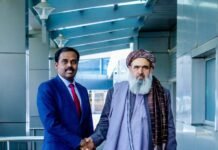Naveed Hussain Mangi
Indian elections have always been a topic of interest for the entire world. In recent years, the relationship between India and Pakistan has become one of the most critical factors influencing Indian elections. The current regime led by Prime Minister Narendra Modi has been accused of using anti-Pakistan rhetoric and the Pulwama attack of 2019 to win the 2020 elections. With the 2024 elections fast approaching, it seems that the Modi government is once again using Pakistan to gain political advantage.
In any democratic country, during an election period, the people of that nation typically focus on issues such as economic prosperity, previous regime performance, a country’s growth, and which representative parties will come up with better policies. However, in the case of India, the focus shifts to how the country will make relations with Pakistan, especially in light of the ongoing conflict in Kashmir. This focus has become more pronounced under the Modi government, which has taken a hard-line stance against Pakistan, accusing it of sponsoring terrorism on Indian soil.
As we approach the 2024 elections, the statements made by Indian Foreign Minister Jai Shankar, one of Modi’s favorites, against Pakistan are clear examples of how the government is using anti-Pakistan rhetoric to influence voters. These statements aim to create a sense of nationalistic pride among the Indian electorate, which the government believes will translate into votes in their favor. Jai Shankar’s recent comments about Pakistan’s role in supporting terrorism and destabilizing the region demonstrate the Modi government’s continued effort to cast Pakistan as India’s enemy and to justify its policies towards Kashmir.
This strategy is not new, and we have seen it in action during the 2019 Pulwama attack, where the Modi government placed the blame squarely on Pakistan’s shoulders. This incident became a rallying point for the government, which used it to create a sense of nationalistic fervor and win the 2020 elections. However, recent revelations made by Satya Pal Malik, the former Governor of the Indian Illegally Occupied Jammu and Kashmir (IIOJK), have once again vindicated Pakistan’s stance on the Pulwama attack. Malik’s disclosures demonstrate how the Indian leadership has habitually used the bogey of terrorism from Pakistan to advance its sham victimhood narrative and the Hindutva agenda, clearly for domestic political gains.
The Modi government’s anti-Pakistan rhetoric is not just limited to election campaigns. It is a key component of its foreign policy towards Pakistan and is aimed at isolating the country from the international community. The Modi government has taken a hard-line stance on the Kashmir issue, revoking Article 370, which granted autonomy to the state, and has continued to impose a lockdown in the region. This policy has led to a humanitarian crisis in Kashmir and further destabilized the region, making it a hotbed of terrorist activity.
Moreover, the Modi government’s policies have also hurt the economic and social fabric of the country. The Indian economy has been in a downward spiral for some time now, with high unemployment rates and a lack of investment. The government’s focus on anti-Pakistan rhetoric has taken away the attention from the real issues affecting the country, such as economic growth, job creation, and social welfare. Indian political leaders must move beyond using Pakistan as a convenient political tool for domestic gains and focus on building lasting peace and stability in the region. Only then can the people of both countries truly benefit and progress toward a brighter future. Policymakers and foreign policy experts must recognize this fact and work towards a constructive and collaborative approach to resolve outstanding issues between the two countries.
In conclusion, the relationship between India and Pakistan has become an essential factor in Indian elections, and the Modi government’s anti-Pakistan rhetoric clearly indicates its efforts to win votes. However, this strategy has led to further polarization in society and taken the focus away from the real issues affecting the country. The Indian electorate must decide whether they want a government that focuses on hate speech and jingoism or on economic growth, social welfare, and peaceful relations with its neighbors.
Also read: Exploring the unique economic potential of Pakistan’s Pink Salt
*Naveed Hussain Mangi is a student of International Relations pursuing a bachelor’s degree at the University of Karachi. His work has been published in both national and international media.
**The opinions expressed in this article are solely those of the author and do not reflect the views or position of The Diplomatic Insight. The organization neither endorses nor takes responsibility for the content of this article and its accuracy.
Established in December 2008, The Diplomatic Insight is Pakistan’s premier diplomacy and foreign affairs magazine, available in both digital and print formats.







